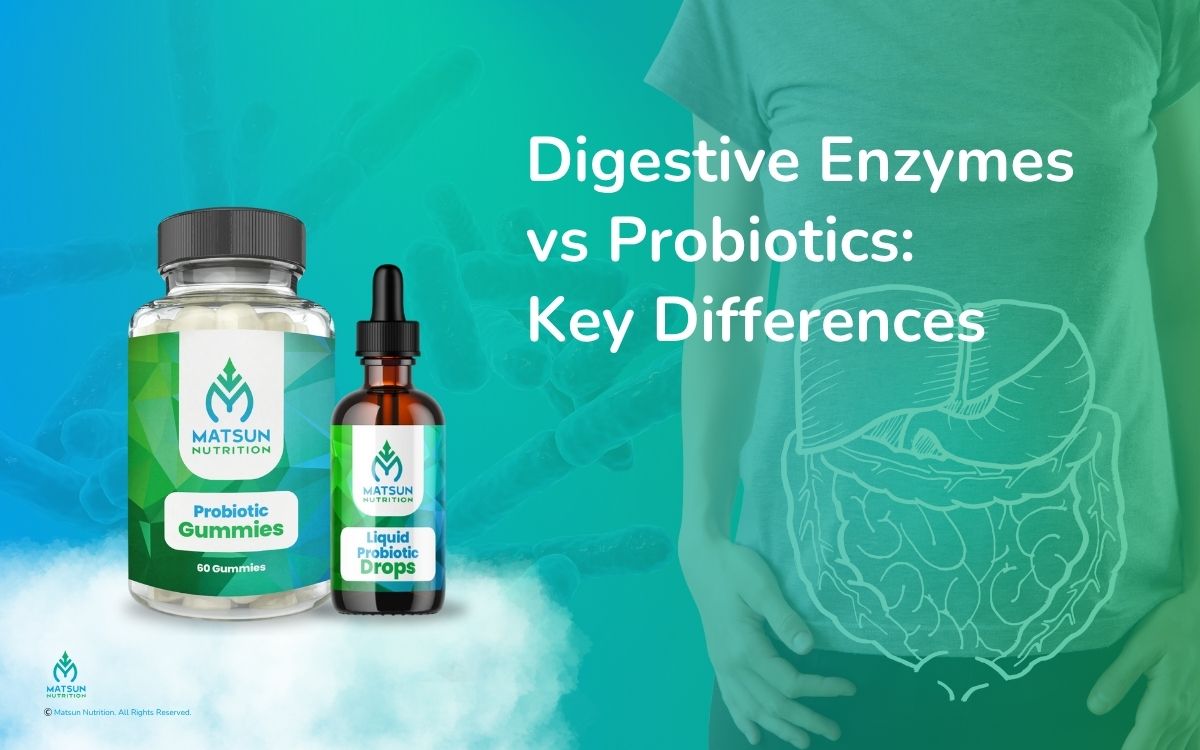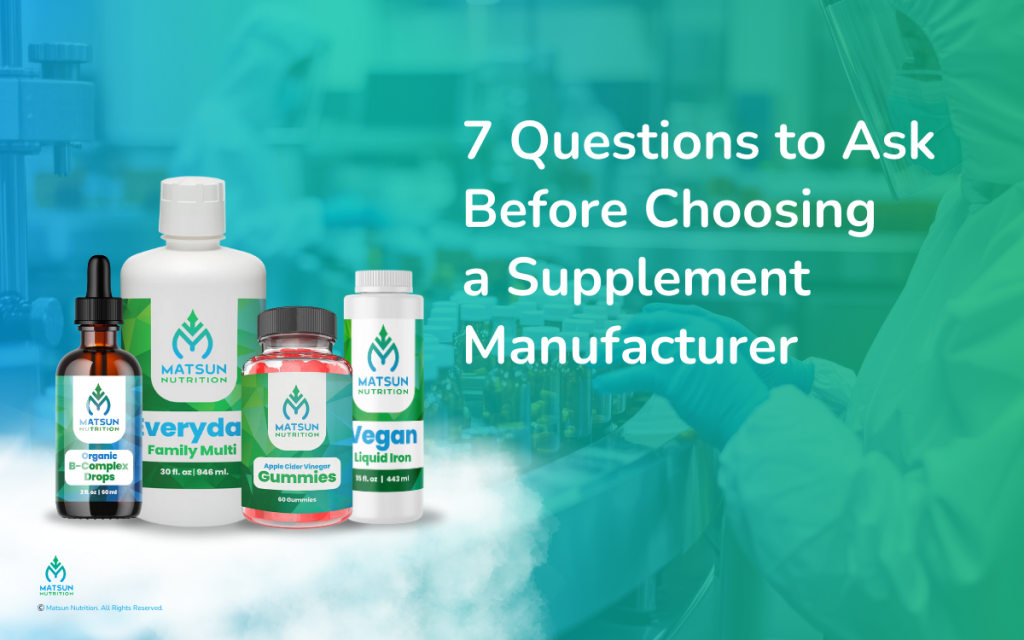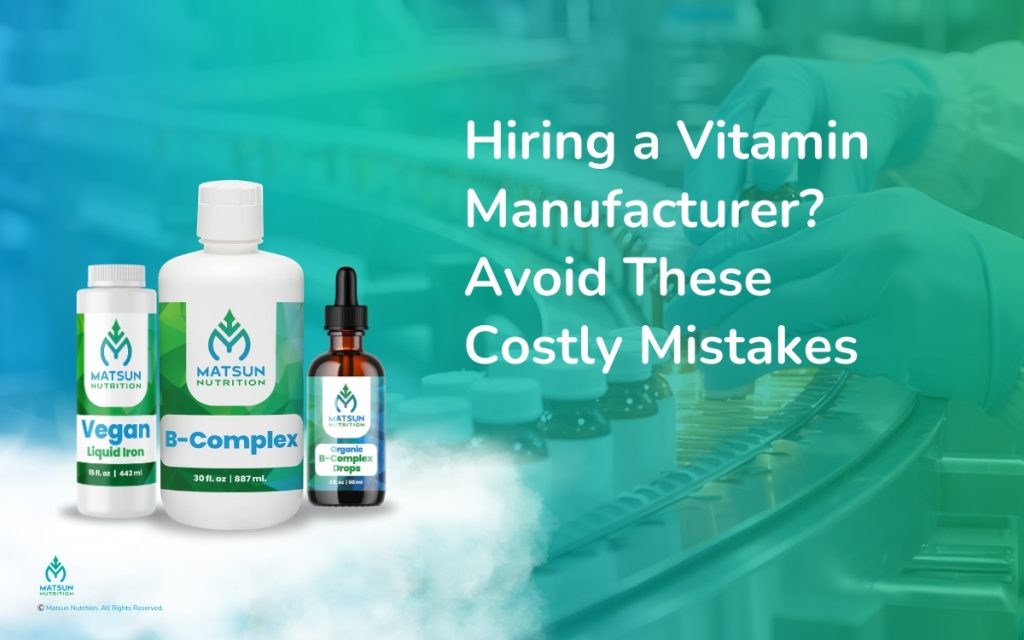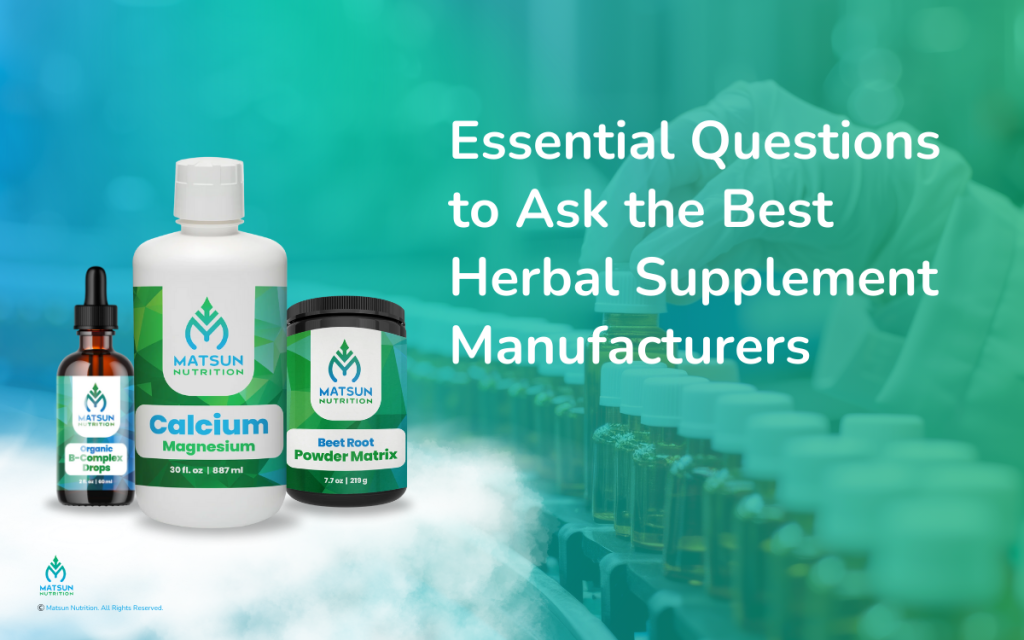Gut health can oftentimes feel overwhelming. Between digestive enzymes, probiotics, prebiotics, and everything in between, it’s hard to know where to start. If you’ve ever stood in the supplement aisle wondering whether you need digestive enzymes or probiotics (or both?), you’re not alone.
When it comes to digestive enzymes vs probiotics, your gut affects everything. Your energy, your mood, your immune system, even your skin. So when something feels off, whether it’s bloating after meals, frequent bathroom trips, or just general discomfort, you want real answers that actually work.
The good news is that you don’t need a biology degree to understand the difference between probiotic and digestive enzymes. These two supplements get confused all the time, but they’re actually quite different. This blog will break down what’s the difference between digestive enzymes and probiotics in plain English, help you figure out which one you need, and answer whether you can take both together.
Digestive Enzymes vs Probiotics: The Core Difference
Here’s the simplest way to think about it: digestive enzymes are like scissors that cut up your food, while probiotics are like gardeners that tend to your gut’s ecosystem.
Digestive enzymes are proteins that break down what you eat into smaller pieces your body can actually absorb. They get to work immediately when food hits your system. Probiotics, on the other hand, are living bacteria (yes, the good kind!) that move into your gut and help maintain a healthy balance over time.
Think of it this way: if you’re struggling to digest a heavy meal right now, you need scissors (enzymes) to help cut it up. If your whole digestive system feels off-balance, you need gardeners (probiotics) to restore order.
The difference between digestive enzymes and probiotics matters because it helps you know when to use each one. If you need quick digestive support after eating, enzymes can help. If you want to nurture long-term gut balance and overall wellness, probiotics can help. Different needs require different solutions.
What Exactly Are Digestive Enzymes and How Do They Work?
Your body is actually pretty amazing at making its own digestive enzymes. Your pancreas, stomach, and small intestine are enzyme-producing factories. These enzymes have specific jobs: amylase breaks down carbs, protease handles protein, and lipase tackles fats.
The process starts the moment you take a bite. Amylase in your saliva begins working on carbohydrates while you’re still chewing. Then pepsin kicks in once food hits your stomach’s acidic environment. Most of the heavy lifting happens in your small intestine, where a cocktail of enzymes finishes breaking everything down.
But here’s where it gets tricky. Sometimes your body doesn’t make enough enzymes on its own. Maybe you’re getting older (enzyme production naturally decreases with age). Maybe you’re stressed out (chronic stress messes with digestion). Maybe you’re lactose intolerant (you’re literally missing the enzyme that breaks down dairy). Or maybe you just had a huge holiday meal and your system needs support.
That’s where enzyme supplements come in. They typically include a mix of plant-based or animal-derived enzymes to cover all your bases. You’ll see lactase for dairy, alpha-galactosidase for those gas-inducing beans and veggies, and bromelain or papain for proteins.
The good thing is that these supplements work fast. Within 30 minutes, they’re helping your body break down that meal.
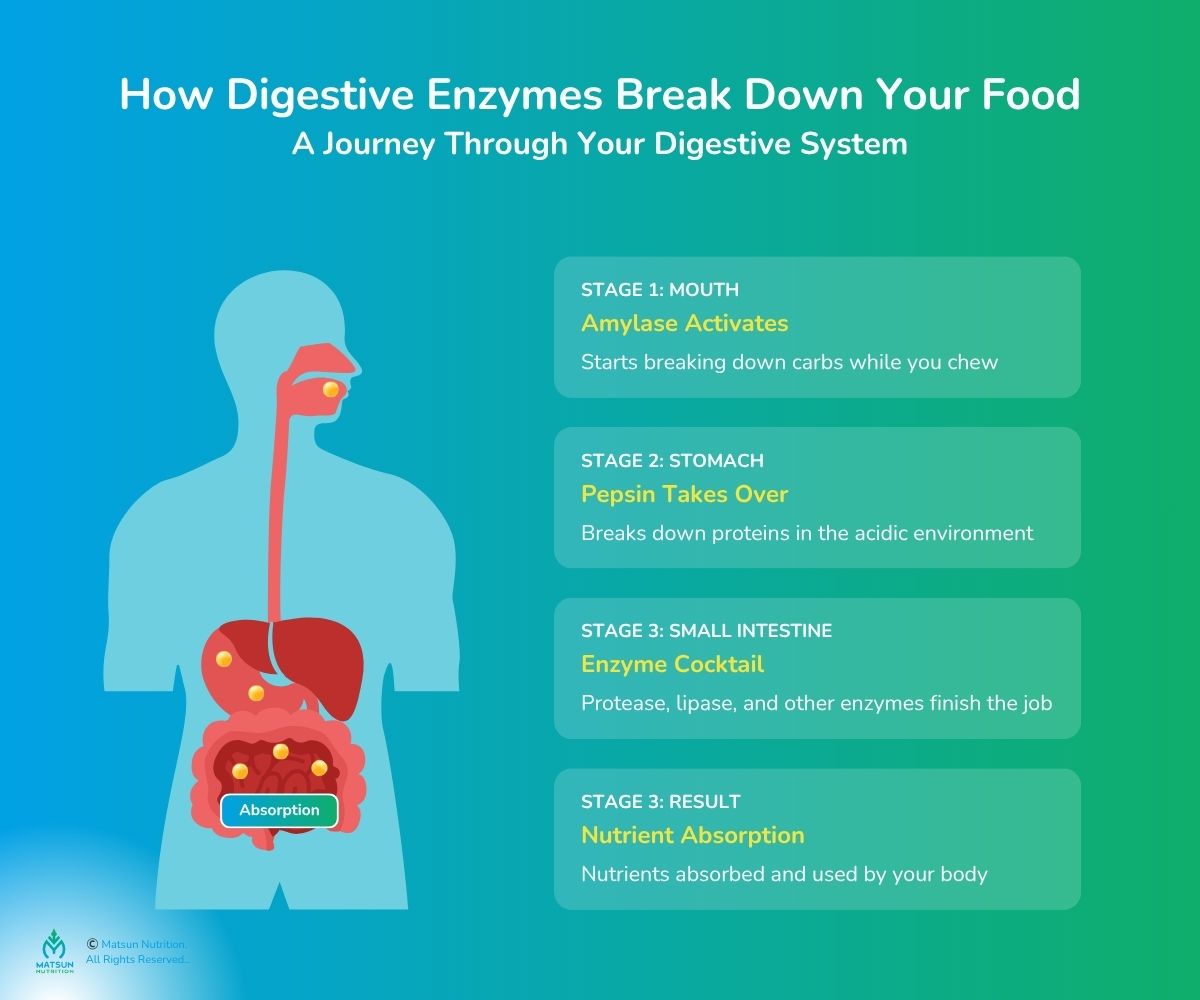
Comparison: Digestive Enzymes vs Probiotics
| Feature | Digestive Enzymes | Probiotics |
| Function | Breaks down food (proteins, fats, carbs) into small, absorbable nutrients. | Supports the gut environment by balancing bacteria and supporting the immune system. |
| Nature | Non-living proteins (“Scissors”). | Living microorganisms (“Gardeners”). |
| Speed | Immediate action (Taken with meals). | Gradual action (Requires 2–4 weeks of consistent use). |
| Primary Use | Bloating, gas, discomfort linked to specific meals, or known food intolerances. | Chronic digestive issues, post-antibiotic use, immune support, overall gut health. |
| Manufacturing Focus | Potency, stability, and standardization of enzyme activity units. | Strain viability, guaranteed CFU count through expiration, and microencapsulation. |
Probiotics Explained: How Do These Live Cultures Function?
Now let’s talk about probiotics. These are living microorganisms (mostly bacteria, sometimes yeast) that are actually good for you. Probiotics are in your gut, and they do way more than just help you digest food.
Probiotics are like a support team for your entire digestive system. They produce substances that feed your gut lining, create an environment where bad bacteria can’t thrive, crowd out harmful bacteria by taking up space, and strengthen your intestinal barrier so unwanted stuff can’t sneak into your bloodstream.
But it gets even more interesting. About 70% of your immune system lives in your gut. Probiotics communicate directly with your immune cells, basically training them to spot real threats while ignoring harmless things. Certain strains have been shown to help with everything from irritable bowel syndrome and inflammatory conditions to allergies and even mood issues.
Unlike enzymes that work immediately, probiotics need time to settle in. It usually takes a few weeks of consistent use to see real benefits. Different strains do different things too. Lactobacillus rhamnosus GG supports immune health, Bifidobacterium longum might help with stress, and Saccharomyces boulardii can prevent diarrhea when you’re on antibiotics.
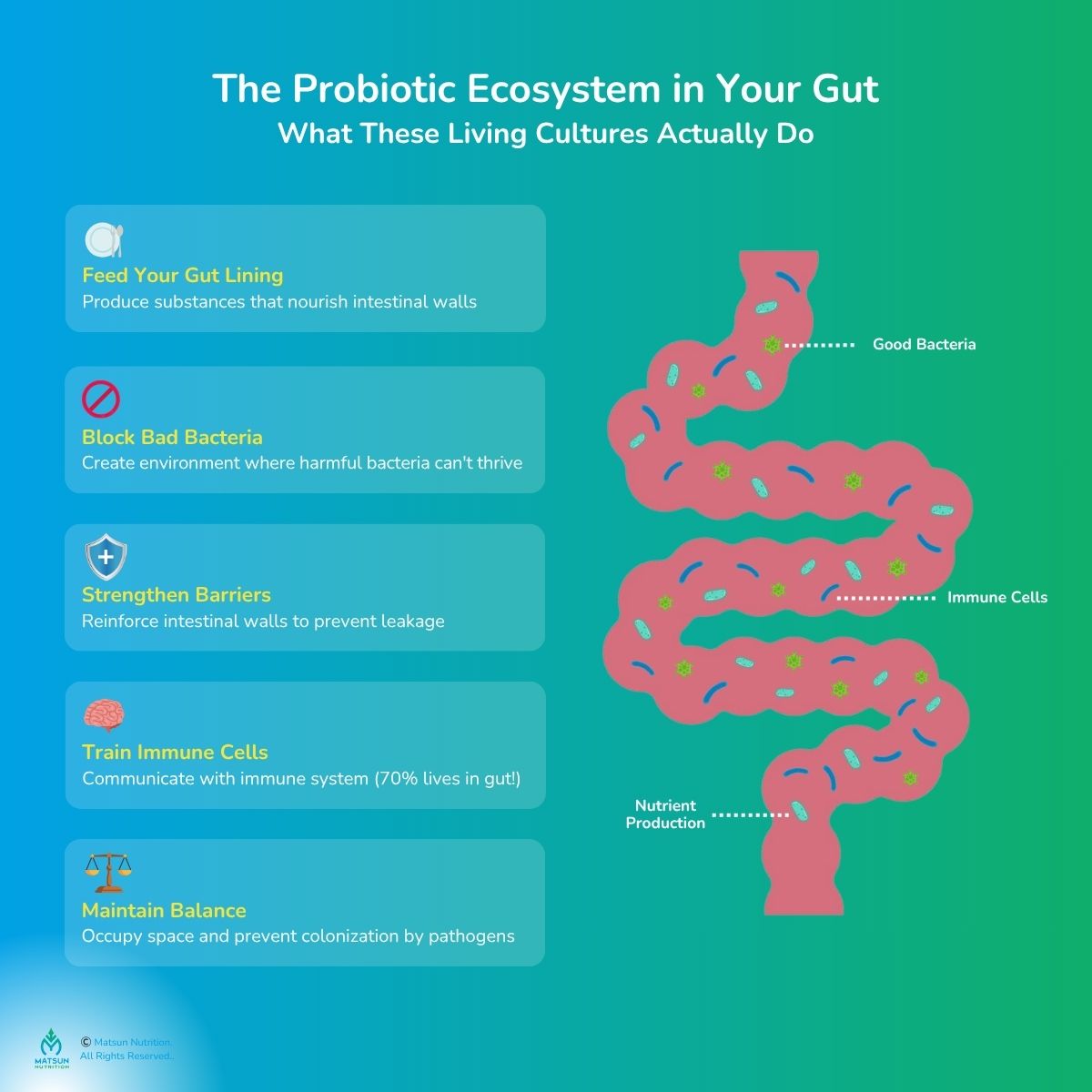
Digestive Enzymes or Probiotics: Which One Should You Take?
Alright, let’s get practical and talk about how to know if you need digestive enzymes or probiotics.
Go with digestive enzymes if: You often feel bloated, gassy, or uncomfortable within an hour or two after eating. This is especially true if certain foods consistently cause discomfort. Like dairy leading to cramps, fatty foods feeling heavy, or high-fiber meals leaving you bloated. Digestive enzymes can be helpful when your body needs extra support breaking down specific foods or handling occasional heavy meals.
Choose probiotics if: Your gut challenges are more ongoing or not tied to specific meals. Maybe your bathroom schedule is unpredictable, you’ve recently finished antibiotics, or you’re just aiming to maintain a balanced gut environment. Probiotics can also support overall digestive harmony and contribute to broader wellness factors like skin and mood balance.
A helpful way to think about timing: If your discomfort appears soon after eating and clearly connects to what you ate, digestive enzymes are likely the right choice. But if symptoms occur throughout the day, regardless of meals, or you’re noticing things beyond digestion, like changes in skin, energy, or mood, probiotics may be the better fit.
Your recent health history matters, too. If you’ve taken antibiotics recently, your gut microbiome may benefit from probiotic support. If you’ve been advised by a healthcare professional that you have lactose intolerance, celiac tendencies, or pancreatic enzyme insufficiency, enzyme supplements might be worth talking about.
Are Digestive Enzymes the Same as Probiotics?
Short answer: Nope, not even close.
Are digestive enzymes probiotics? Definitely not. I know they’re both sold in the same section of the store and both help with digestion, but that’s where the similarities end.
Digestive enzymes aren’t alive. They’re proteins that speed up the chemical reactions needed to break down food. They don’t linger in your gut, they don’t interact with your immune system (beyond their digestive job), and they don’t change the balance of bacteria living in there.
Probiotics are living microorganisms that need to survive your stomach acid, reach your intestines alive, and settle in. Once there, they work alongside your existing gut bacteria to help maintain balance, support nutrient absorption, and produce beneficial compounds. Their influence extends beyond digestion, impacting everything from how you feel to your overall sense of well-being.
It’s easy to see why people ask, “what’s the difference between probiotics and digestive enzymes?” The confusion happens because some probiotic strains can actually help your gut produce more enzymes naturally. But they’re not the same thing, they’re two separate tools that support digestion in different ways.
Difference Between Probiotic and Digestive Enzymes
Let’s dig a bit deeper into what is the difference between digestive enzymes and probiotics by looking at what they’re made of, how fast they work, and what they actually do.
What they’re made of: Enzyme supplements contain proteins from plants (like papaya or pineapple), animals, or fungal cultures. These proteins are stable and spring into action when they encounter food. Probiotic supplements or probiotic gummies contain specific strains of bacteria or beneficial yeast that must stay alive to work. They need careful handling and sometimes refrigeration to keep them viable.
How fast they work: Enzymes are the instant gratification option, because they work during specific meals. You can take them just when you need them. Probiotics require patience. You need to take them daily for 2-4 weeks before you’ll notice a real difference, because they’re slowly changing your gut environment.
What problems they solve: Enzyme issues show up as food-specific troubles; gas from beans, dairy discomfort, or malabsorption symptoms. Probiotic benefits spread across your whole system: immune support, mental health through the gut-brain connection, skin health, weight management, and reducing inflammation throughout your body.
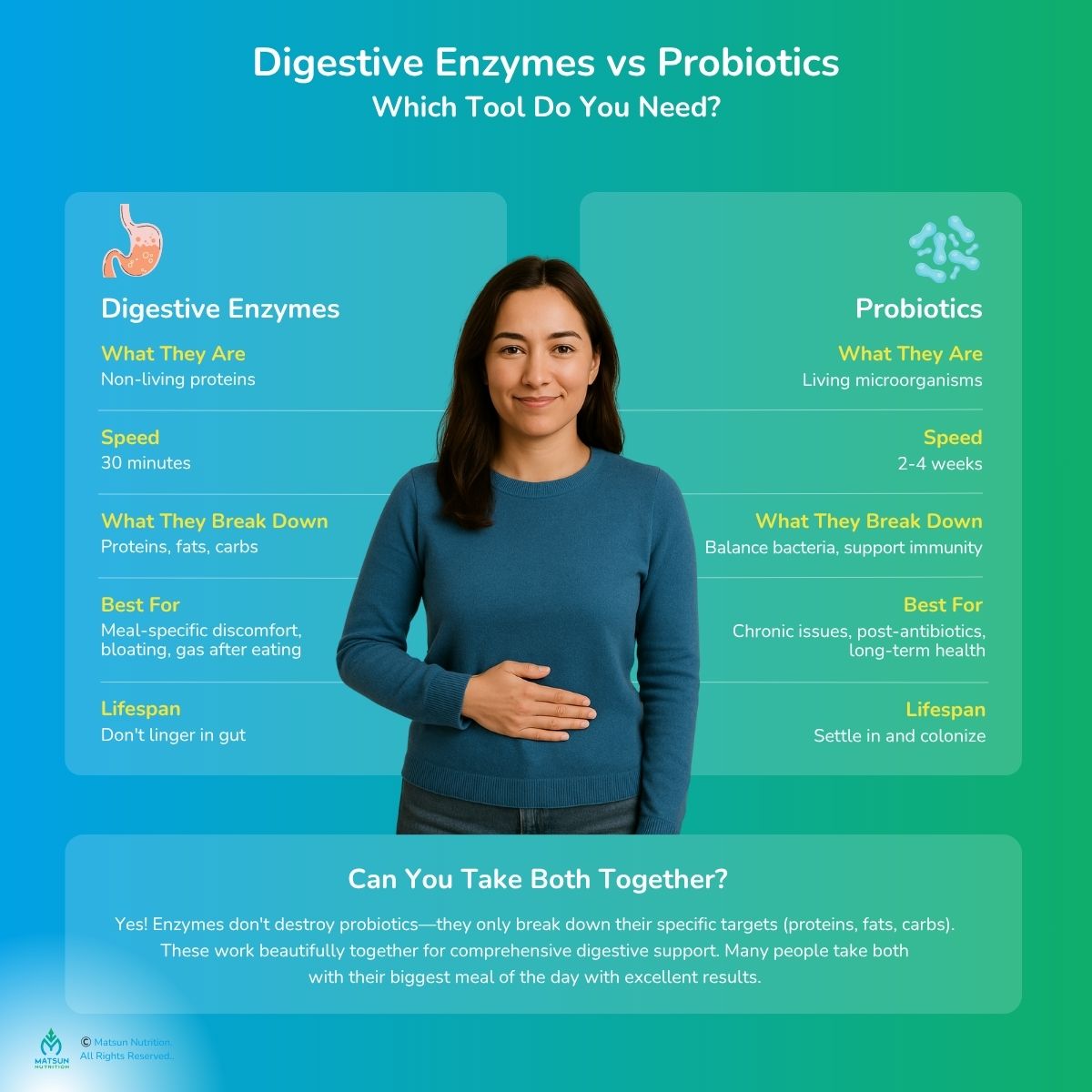
Targeting Your Gut Health Needs with Proper Supplementation
So how do you actually use this information to feel better?
If you’re dealing with meal-related symptoms, start with a broad-spectrum digestive enzyme supplement. Take it right before or with meals that typically give you trouble. Pay attention to patterns. Maybe you need extra lactase for dairy or alpha-galactosidase when you eat cruciferous vegetables.
If you’re tackling chronic gut issues, commit to a quality probiotic with diverse strains and sufficient CFUs (colony-forming units). For general health, 10-50 billion CFUs daily is typical. For specific conditions, you might need more. Look for strains that research shows help your particular issue. Take it at the same time every day, preferably with food to protect the bacteria as they travel through your stomach.
Consider what might be causing your digestive challenges. As you get older, your body’s natural enzyme production tends to slow down, so consistent enzyme support may be helpful. If you’re under a lot of stress, that can affect both enzyme activity and the balance of beneficial bacteria. This means that your gut may benefit from both enzymes and probiotics. And if you’ve been advised by your healthcare provider that you have a digestive condition or specific dietary restriction, it’s best to discuss the right supplement approach with them.
Quality really matters here. Look for third-party testing, GMP certified supplement manufacturers, and clear labels. For enzymes, check the activity units (not just weight) for each enzyme type. For probiotics, make sure you can see the specific strains, guaranteed CFU count through expiration, and evidence they survive stomach acid.
Can You Take Probiotics and Digestive Enzymes Together?
Yes! And honestly, many people find that taking both digestive enzymes and probiotics together works really well. They do completely different things, so they don’t interfere with each other.
Here’s a common worry: “Won’t digestive enzymes destroy my probiotics?” Nope. Enzymes are picky. They only break down their specific targets (proteins, fats, or carbs). They don’t recognize or attack bacterial cells. Your stomach acid is actually way more dangerous to probiotics than any enzyme supplement.
When it comes to digestive enzyme vs probiotic, it helps to understand how they differ, what they’re made of, how quickly they work, and the specific roles they play. Using both can make sense if you’re supporting multiple aspects of gut function. For instance, after a course of antibiotics, probiotics can help restore a balanced gut environment, while lactase or other digestive enzymes can assist with breaking down certain foods like dairy. Similarly, if you experience occasional digestive discomfort tied to food sensitivities alongside an imbalance in gut bacteria, combining enzymes and probiotics may offer more well-rounded support.
As for timing, take enzymes right before or with meals for best results. Probiotics are more flexible. Taking them with food is good because it buffers stomach acid, but consistency matters more than exact timing. Lots of people just take both with their biggest meal of the day without any problems.
Choosing the Right Supplement Manufacturer for Quality
Whether you’re buying supplements for yourself or developing a product line, quality makes all the difference. The whole probiotic vs digestive enzyme debate doesn’t matter if the supplements you choose don’t actually work.
For probiotics especially, custom supplement manufacturing matters a lot because you’re dealing with living organisms. They need to be kept at the right temperature, packaged properly, and formulated to survive stomach acid. Poor quality control means dead bacteria that won’t help anyone.
Enzyme supplements need proper standardization so you know exactly what activity level you’re getting. The manufacturing process affects enzyme stability and potency.
Look for manufacturers with GMP Certification, rigorous testing protocols, and transparent ingredient sourcing. They should be able to provide certificates of analysis showing their products contain what the label claims. For probiotics, they should guarantee CFU counts through expiration, not just at manufacture.
RELATED READ:
The Final Word on Your Probiotic vs Digestive Enzyme Choice
At the end of the day, understanding the question: “what are digestive enzymes and probiotics?” helps you know what your body really needs. Digestive enzymes offer quick relief from food-related discomfort, while probiotics work more slowly to build lasting gut health that supports your entire body.
But, you don’t have to choose just one. These supplements work beautifully together when you need comprehensive digestive support. The key is starting with quality products that actually contain what they promise.
Learning about probiotics vs digestive enzymes can be complex, but choosing the right manufacturing partner shouldn’t be. Whether you decide to focus on high-potency enzymes, specialized probiotic strains, or a synergistic blend of both, success depends on sourcing, compliance, and quality. Trust your product vision to a GMP-certified manufacturer with decades of experience in complex custom formulations.
Ready to launch your own line of high-quality digestive health supplements? Contact Matsun Nutrition today for expert manufacturing and custom formulations!
Frequently Asked Questions
Are digestive enzymes the same as probiotics?
No, they’re completely different. Digestive enzymes are proteins that break down food, while probiotics are living bacteria that support your gut. They work in different ways and solve different problems.
What is the difference between these two supplements?
Digestive enzymes work right away to help your body break down food during meals, supporting smoother digestion and nutrient absorption. Probiotics, on the other hand, are living microorganisms that gradually establish themselves in your gut and help maintain a balanced digestive environment. Over time, this balance can positively influence not just digestion but also overall well-being.
Should I take digestive enzymes or probiotics?
It depends on your symptoms. Choose enzymes if you have food-specific digestive issues that happen right after eating. Choose probiotics for ongoing gut imbalance, immune issues, or after antibiotic use. Consider your timing and type of symptoms.
Can I take both digestive enzymes and probiotics?
Absolutely! They work through different things and don’t interfere with each other. Many people benefit from taking both together, especially if they’re dealing with multiple digestive concerns. Just take enzymes with meals and probiotics consistently each day.
Which supplement should I take for bloating?
If bloating happens right after eating specific foods, try digestive enzymes first. If bloating is constant throughout the day regardless of meals, probiotics might address the underlying gut imbalance better. Pay attention to when your bloating occurs.
Are probiotics the same as digestive enzymes?
No, they’re different. Probiotics are living microorganisms that support gut health over time. Digestive enzymes are non-living proteins that break down food immediately. Both support digestion but in completely different ways.
Do digestive enzymes kill the helpful probiotic bacteria?
No, digestive enzymes don’t harm probiotics. Enzymes only act on their specific targets like proteins, fats, and carbohydrates. They don’t recognize or attack bacterial cells. You can safely take both supplements together without worrying about one damaging the other.
What is the difference between probiotic and enzymes?
Probiotics are living bacteria that populate your gut and provide long-term health benefits throughout your body. Enzymes are proteins that work immediately to chemically break down food into absorbable nutrients. Probiotics require consistent daily use while enzymes can be taken as needed.

